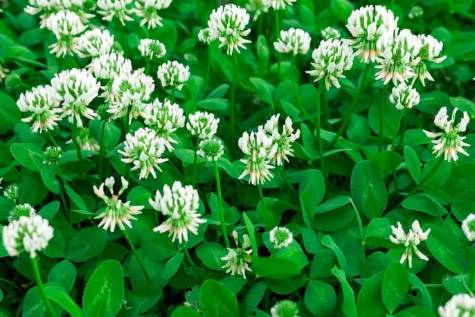White Clover

This weed has a mixed reputation with some homeowners wanting it to disappear while other homeowners see it as an opportunity to help pollinators by using clover as a low maintenance lawn alternative. No matter where you fall on the spectrum you likely have some clover somewhere in your yard. White clover is a member of the legume family and is known for it’s ability to fix nitrogen in the soil. It is a prostrate, mat forming herbaceous perennial that has unique leaves with 3 to 4 leaflets and white blooms throughout the growing season. White clover grows four to six inches tall and can spread over 12” or more by stems that root freely to the ground.
This clover is native to Europe but it has naturalized across the United States. In a home lawn, clover is a common issue and can be a symptom that your grass is suffering from a lack of nitrogen in the soil. Once established, clovers are hard to kill however products containing the active ingredients dicamba, clopyralid, fluroxyper and quinclorac or a product with a combination of those products tends to have the best success. The best time to control clover is in the fall when the plant is actively transporting sugars to it’s roots for the winter, if you spray in the spring there maybe some regrowth of the plant and a lack of control.
Clover can also make a wonderful alternative to traditional grass lawns. In fact at one-point, white clover seed was included in cool season turf grass seed however that practice has been mostly discontinued. Clover responds to mowing with aggressive growth and tolerates some traffic. There are few disease or insect issues with clover making it a low maintenance option that requires less mowing, water or chemical applications than traditional lawns. While white clover is not a lawn option for everyone, how much we try to keep it out of our lawns is ultimately a personal preference.

Have questions? Contact our office where our Horticulture Extension Agent will assist you with questions.
Phone: (316) 321-9660
Email: callae@ksu.edu